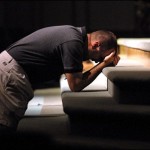
by Fr. Patrick Henry Reardon
Perhaps among the least appreciated, and seldom thought on, descriptions of Jesus our Lord is the one given by John the Baptist:
“His winnowing shovel is in His hand, and He will thoroughly clean out His threshing floor; and gather His wheat into the barn; but He will burn up the chaff with unquenchable fire” (Matthew 3:12).
Threshing is a violent activity. It is done by pounding the grain repeatedly on a stone floor with a shovel or a flail, in order to separate it from the husks which enclose it. The discarded husks are called chaff. When this beating of the grain has been done, the thresher uses his shovel to throw it into the air, so that the wind will carry away the light and useless chaff, leaving the heavier kernels to fall once more to the threshing floor. This latter action is called winnowing.
Yes, threshing and winnowing are violent activities; they are likewise, if one may say so, very judgmental activities. Threshing and winnowing are emphatic, even ferocious ways of asserting
“this, and not that.”
The thresher addresses the grain and the chaff, as it were,
“You stay put, but you get out of here.”
The separation of the two things is truly final. The grain and the chaff grew up together, but they will never be together again.
This definitive separation of wheat and chaff, this principle of a final acceptance and rejection of human decisions, is essential to the Gospel itself, because it affirms the everlasting significance of those decisions. Consequently, this biblical threshing stands directly at variance with those religious philosophies constructed on “the myth of the eternal return,” in which all human decisions made in history are “subject to further review,” so to speak, and eventual correction in an afterlife, in order to achieve a universal reconciliation. This latter heresy was appropriately condemned at the Fifth Ecumenical Council in 553.
The biblical teaching about God’s threshing, then, is asserted as though to answer the question contained in the provocative title of a book by a well known theologian of the twentieth century, Dare We Hope
“That All Men Be Saved”? (Allversöhnung?).
No, we do not dare to hope for such a thing. It is a delirious fantasy, not a proper object of Christian hope, or a proper subject for Christian speculation. St John of Mount Sinai warns us, in fact, of the spiritual danger of even entertaining such a thought (The Ladder of Divine Ascent, Step 5, “On Repentance“).
If wheat and chaff are ultimately the same thing, then human choice is a mirage, human history only a theatrical production, and the death and resurrection of Christ ultimately meaningless. Jesus as Savior must not be disconnected from Jesus as Thresher.
Just where in the gospels, however, do we detect Jesus acting as Thresher? In answering that question, most average readers of the Bible would probably refer to our Lord’s driving the money changers from the temple, and they would surely be correct in that reference. When Jesus drove the money changers from the temple, it was the most eschatological of actions. Jesus thereby affirmed that the temple precinct really is separated from an “outside,” where are found
“dogs and sorcerers and the sexually immoral and murderers and idolaters and whoever loves and practices a lie” (Revelation 22:15).
The Bible’s final book does not portray an afterlife of universal reconciliation, but an everlasting separation of wheat and chaff.
Even that earthly temple purged by Jesus was constructed on an ancient threshing floor (2 Chronicles 3:1), Arauna’s large flat rock where David, for his final sin, was flailed by the angel of judgment (2 Samuel 24:18-25). Indeed, the place where man meets God and places himself under the divine gaze is ever the hard surface of his purging. Prayer itself is a striking of the soul, that the wheat may be beaten free of the chaff. Hence, in this world the true temple is necessarily constructed on a threshing floor. There, before the face of God, the heart is afflicted in repentance, the contrite and broken heart that God will not despise; indeed, this very breaking of the heart is the sacrifice that God requires (Psalms 51[50]:17).
Such is the authentic worship of God in the true temple of the soul, the prayer of repentant sinners who never cease to beat their breasts and plead for mercy (Luke 18:13; 23:48).
